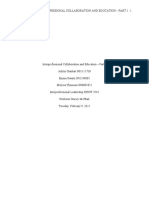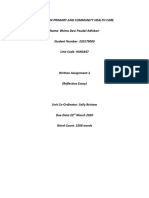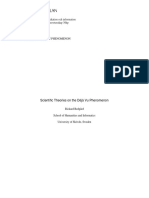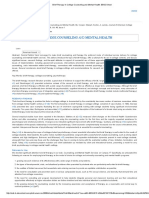Sem1 Nurs103 Theory 1 - Vasanthy Harnanan - Determinants of Health Essay
Sem1 Nurs103 Theory 1 - Vasanthy Harnanan - Determinants of Health Essay
Uploaded by
api-314325486Copyright:
Available Formats
Sem1 Nurs103 Theory 1 - Vasanthy Harnanan - Determinants of Health Essay
Sem1 Nurs103 Theory 1 - Vasanthy Harnanan - Determinants of Health Essay
Uploaded by
api-314325486Original Title
Copyright
Available Formats
Share this document
Did you find this document useful?
Is this content inappropriate?
Copyright:
Available Formats
Sem1 Nurs103 Theory 1 - Vasanthy Harnanan - Determinants of Health Essay
Sem1 Nurs103 Theory 1 - Vasanthy Harnanan - Determinants of Health Essay
Uploaded by
api-314325486Copyright:
Available Formats
Student#: N00180321
Scholarly Assignment:
Reflective Practice Exploring Health Beliefs and Determinants of Health
Student Name: Lara Pabandero de Lasan
Student No: N00180321
Date Submission: October 21, 2014
NURS103: Practical Nursing Theory
Professor:
Humber College
Student#: N00180321
Reflective Practice Exploring Health Beliefs and Determinants of Health
World Health Organization, (1948), defines health as a state of complete physical,
mental and social well-being and not merely the absence of disease or infirmity. To me, this
means that health is not only about nonexistence of disease, but also wellness with the
individual as a whole, not only physically but also mentally and socially. Health can be further
defined with more components, such as Humber College Practical Nursing Program Philosophy
of Nursing (Harnanan, power point slides, 2014) defines health a state of optimal dynamic
functioning of the bio-psychosocial and spiritual dimensions of the individual, family and
community. The Humber College definition adds on the concept of spiritual well-being of the
individual and also the family and the community because human beings are social people, we
live to be surrounded by other individuals, we cannot be well if we are by ourselves without a
support system. Spiritual well-being is also important to me, having faith in my life was
significant growing up until now, and that is why I chose both definitions of WHO (1948) and
Humber College. All of these components put together, best describe how I define health and
well-being. In class we spoke about Holism, which is wellness physically, emotionally, mentally,
socially, and spiritually. If all aspects are taken care of, then I believe that is the optimal health
wellness and well-being.
The purpose of this paper is to reflect on my personal and cultural health beliefs and
practices in regards to two determinants of health, to compare and contrast them with another
classmate of a different cultural background, and finally analyze how my future nursing
profession would be influenced by comparative learning with the knowledge of these cultural
differences. The two determinants of health that will be focused on are income and social status,
and social support networks. I will compare and contrast these determinants with my own health
Student#: N00180321
practices and culture, Filipino, with one of a Chinese origin. I chose to discuss the above
mentioned determinants of health as supposed to the others in the list of 12 determinants because
there were both some differences and similarities within the topics. Income and social status, I
believe has a big influence on our health practices, especially with the financial aspect of it, in
Canada, Philippines or China. Social support networks can be anybody or anything that can be
of support to an individual, their family, organizations, the government or any network that will
help and support the person, however the Filipino and Chinese have a contrast regarding patient
care and who makes the decisions, these will be discussed in more detail later.
Income and social status determinant of health
Firstly, income and social status determinant of health is important and has a big
significance to the health and well-being of a person. Theres a life quote I read, live to work or
work to live, I think this means that there are two options, to be privileged to have a fulfilling
job and love your work or career that is why a person lives, or to work at any job just to be able
to provide food on the table for your family and loved ones to stay alive. The former is generally
within the rich population where they can choose any career path they want and not worry
about the money provided by that career, however the latter is more geared towards the less
fortunate where they have to work odd jobs or any job at all so that there is food to eat at the end
of the day. Talking with my classmate, (CM) there were some differences and similarities when
it came to our experiences with income and social status. In the Philippines, in terms of health
care, to my recollection there is none. If you were poor, and did not have money to buy
medication or could not afford to go to the hospital, you would die at home. In China, CM said
that in the city, (urban area), if you were to go to the hospital there would be some government
assistance, although it was also expensive like the Philippines to seek help, however you would
Student#: N00180321
receive something from the government financially. That was the difference between the two
countries. In the Philippines, if you are lucky, an organization can help you, your family, and
your friends, unlike in Canada where we have the Canada Health Act, there is a universal
equality in getting public health services. However, CM did mention that in the rural areas of
China, it was sort of the same with the Philippines where hospitalization was a very big burden.
In China, living in a rural area increased the possibility of reporting poor health and that the
urban population were healthier compared with the rural population (Yang, Kanavos, p.804,
2012) which coincide with what CM said. This is the big economic status gap between the rich
and the poor, in the Philippines and China both, the desired career path of an individual may not
be the one to provide for the family financially and therefore will lead to working at a job that
was not their first choice. Many Filipinos want to go abroad, for a better future for their family,
although the Philippines is a great country that I will always go back to for vacations, I cannot
live there and work as a nurse. If I was rich, I would be able to live in the Philippines, but to
work there as a part of the middle class is very hard.
Social support networks determinant of health
Secondly, the other determinant of health that will be examined is social support
networks. Social support affects health, health behaviours, and health care utilization through
practical, emotional, informational, and affirmational supportsome experts believe that
relationships may be as important to health (Potter & Perry et al, 2014). As I said earlier
humans are social and we need to be surrounded by people who love and support us throughout
our lives. This statement is the same for the Filipino and Chinese culture, family support
network is very important to both cultures. CM said that when her mother was diagnosed with
cancer, she and her sibling were the first ones informed by the doctor instead of how we are used
Student#: N00180321
to, the other way around, the patient first and if the patient gave consent, the family can be
informed. They were also the ones who made the decision for their mothers care plan, and the
patient was the last one informed of her diagnosis and the care to be implemented. The Chinese
family has the ultimate decision, not the patient making decisions for his or herself. Chen (2002)
states, the emphasis on group or collectivity is designed to ensure the strength of the family.
One sacrifices his or her personal interest if it does not benefit the family as a whole. I found
this very interesting and different from my culture. The Filipino culture is very much the same
as the Western culture when it comes to patient and health care professional confidentiality. If
one wishes not to inform their family about their health, then that information will only be
between the patient and the health care professional. Having said that, family is very important
to the Filipino culture as well, like the Chinese, family may have some influence on the decision
making process, but the patient will have the ultimate decision on how to go about their care.
Analysis
Thirdly, I think that my nursing practice will be greatly influenced after comparative
learning, talking with CM and backing it up with some research. When I interact with another
culture, like CMs Chinese culture, with their health care practices who ever my patient is, it may
be the patient only or the patient and the family as one. At the beginning of the talk with CM, we
started with various topics, learning so much things about the Chinese culture, how they handled
death and the funeral, how numbers and symbols were very important in their way of life, how
herbal and western medicine were both used in their culture and so much more. I realized the
importance of knowing how to approach the client of a different culture and how it would
influence me in my nursing career in the future. I will be able to put into practice the
understanding why a Filipino patient may cringe when I mention the list of procedures to be
Student#: N00180321
done during their stay at the hospital because they may still be thinking of how it was like in the
Philippines that they have to pay for every procedure, every equipment that the doctor or nurse is
going to use and every hour they stay in the hospital bed that they are occupying. I now have
more insight on how to approach and deal with different cultures, hearing from personal
experiences like CM, had a huge impact on me. I will be more cognisant of how the family
influences the patients decision for their care plan especially in the Chinese culture. More
understanding when the family members speak first and the patient last or have no input at all,
but also to advocate for that patient if that is what they really wanted. However, it is also
important that not all Chinese people practice that high level of family involvement. Just like
me, I immigrated to Canada when I was eight years old, and I do not practice to the same degree
as my family, I have adapted the Western culture to an extent that for some of the Filipino
customs I have to refer to my husband, parents or relatives for more information and guidance.
Conclusion
Culturally sensitive care is imperative especially in a big city like Toronto, we are the
most multicultural city in the world, and I am beginning to see and understand why there is a
great emphasis on culture in the Nursing program. Health and well-being can have many
definitions. They say health is wealth I guess that is true to some extent that if you are healthy,
you are wealthy enough to afford it. Although there are 12 determinants of health, the two that I
had chosen; income and social status and social support network were enough to influence my
future nursing practice, more so when the other 10 determinants are also explored more closely.
This reflective essay made an impact on my awareness with other cultures, it made me more
sensitive towards other ethnicities and I will always go back to this paper as a baseline of what
there is to expect when dealing with different kinds of backgrounds.
Student#: N00180321
References
Chen, Y. (2002). Chinese values, health and nursing. Journal of Advanced Nursing, V(36), I(2)
270-273. Retrieved October 16, 2014 from
http://onlinelibrary.wiley.com.rap.ocls.ca/doi/10.1046/j.1365-2648.2001.01968.x/full
Harnanan, V. (2014, September 3). Humber College Practical Nursing Philosophy. Retrieved
from https://learn.humber.ca/webapps/blackboard/execute/displayLearningUnit?
course_id=_35387_1&content_id=_1308585_1&framesetWrapped=true#
Potter, Patricia, Perry, A., Ross-Kerr, J., Wood, M., Astle, B., & Duggleby. W. (2014). Canadian
Fundamentals of Nursing, 5th Ed. Mosby Canada, VitalBook file, Pageburst.
World Health Organization. (1948). WHO definition of Health. Retrieved October 16, 2014 from
http://www.who.int/about/definition/en/print.html
Yang, W., Kanavos, P. (2012). The less healthy urban population: income-related health
inequality in China. Retrieved October 16, 2014 from
http://www.biomedcentral.com/content/pdf/1471-2458-12-804.pdf
Student#: N00180321
Student#: N00180321
You might also like
- Sem2 Nurs153-Title Page Reflective Practice Through A Community Assessment AssignmentDocument9 pagesSem2 Nurs153-Title Page Reflective Practice Through A Community Assessment Assignmentapi-314325486No ratings yet
- Legal EthicalDocument3 pagesLegal EthicalBinu Kumar100% (1)
- Ipe and Ipc Assignment Part 1Document13 pagesIpe and Ipc Assignment Part 1api-480123713No ratings yet
- Sem4 Preceptor - Rinechia Mcintosh HRH Semester 4 Mary Mcgory K4y 1Document17 pagesSem4 Preceptor - Rinechia Mcintosh HRH Semester 4 Mary Mcgory K4y 1api-314325486No ratings yet
- Issue Analysis Paper Cultural Competence in Nursing ApplebachDocument18 pagesIssue Analysis Paper Cultural Competence in Nursing Applebachapi-283260051No ratings yet
- Nur 420 - Policy Action Plan PaperDocument9 pagesNur 420 - Policy Action Plan Paperapi-375928224No ratings yet
- Smiley - Health Impact Pyramid Research PaperDocument10 pagesSmiley - Health Impact Pyramid Research Paperapi-526685362No ratings yet
- Daily Weights in Heart Failure PICOTDocument12 pagesDaily Weights in Heart Failure PICOTJaclyn Strangie100% (1)
- Case Study Report OORA200Document8 pagesCase Study Report OORA200DingoDrongoNo ratings yet
- Code of Ethics For NursesDocument5 pagesCode of Ethics For NursesKamran Khan100% (1)
- Group Case Assignment 4Document9 pagesGroup Case Assignment 4anushavergheseNo ratings yet
- Nursing Task 131Document8 pagesNursing Task 131ramseyNo ratings yet
- Week 4 ReflectionDocument1 pageWeek 4 ReflectionSara NielsenNo ratings yet
- Regulating Difference: Religious Diversity and Nationhood in the Secular WestFrom EverandRegulating Difference: Religious Diversity and Nationhood in the Secular WestNo ratings yet
- Sem4 - Qa Learning Plan FormDocument3 pagesSem4 - Qa Learning Plan Formapi-314325486No ratings yet
- Accomplishment Report of The English ClubDocument4 pagesAccomplishment Report of The English ClubJason PasteraNo ratings yet
- Bhima Devi Poudel Adhikari 220179000 hsns447 Assignment 1 Reflective EssayDocument8 pagesBhima Devi Poudel Adhikari 220179000 hsns447 Assignment 1 Reflective Essayapi-525310113No ratings yet
- Issue Analysis PaperDocument15 pagesIssue Analysis Paperapi-301611629No ratings yet
- Palliative Care Research Paper T&TDocument30 pagesPalliative Care Research Paper T&TtaurNo ratings yet
- Quality and Safety Education For Nurses CompetenciesDocument5 pagesQuality and Safety Education For Nurses CompetenciesSammy ChegeNo ratings yet
- ThesisDocument84 pagesThesisRobNo ratings yet
- Transformational Leadership Final PaperDocument18 pagesTransformational Leadership Final PaperAnonymous VVSLkDOAC1No ratings yet
- Elizabeth Kawesa Dissertation Social Support Coping Depression and Subjective Wellbeing Among ASD Caregivers PDFDocument88 pagesElizabeth Kawesa Dissertation Social Support Coping Depression and Subjective Wellbeing Among ASD Caregivers PDFwqewqewrewNo ratings yet
- Professional Meeting Reflective Journal-2Document3 pagesProfessional Meeting Reflective Journal-2api-399086837No ratings yet
- Health Impact Framework Paper DraftDocument14 pagesHealth Impact Framework Paper Draftapi-449021066No ratings yet
- Course Reflection-Culture in NursingDocument6 pagesCourse Reflection-Culture in NursingSserumaga JohnBaptistNo ratings yet
- Nursing ImageDocument10 pagesNursing Imageapi-392400343No ratings yet
- Community Assessment PaperDocument18 pagesCommunity Assessment PaperAlyssa CardinalNo ratings yet
- Thinking Like A Nurse 2Document6 pagesThinking Like A Nurse 2api-301064549No ratings yet
- Nnaples - Heart Disease Final Term PaperDocument11 pagesNnaples - Heart Disease Final Term Paperapi-523878990100% (1)
- Name of StudentDocument20 pagesName of StudentHassan KhanNo ratings yet
- Full Text 01Document42 pagesFull Text 01Annisa Agna PuspatamiNo ratings yet
- Running Head: QSEN 1Document11 pagesRunning Head: QSEN 1Mariam AbedNo ratings yet
- PGC Reflection FinalDocument11 pagesPGC Reflection Finalapi-581236671No ratings yet
- Essential VDocument4 pagesEssential Vapi-385640092No ratings yet
- HealthDocument6 pagesHealthapi-422930884No ratings yet
- Margot Bentley Case Final Discussion1Document1 pageMargot Bentley Case Final Discussion1anushavergheseNo ratings yet
- Bullying: A Major Problem in NursingDocument5 pagesBullying: A Major Problem in NursingAshlee Powers100% (1)
- Cultural and Ethical Issues in Working With Culturally Diverse Patients and Their Families The Use of The Culturagram To Promote Cultural Competent Practice in Health Care SettingsDocument14 pagesCultural and Ethical Issues in Working With Culturally Diverse Patients and Their Families The Use of The Culturagram To Promote Cultural Competent Practice in Health Care Settingslagaanbharat100% (1)
- Nurs 5001 - Research Critique 1Document7 pagesNurs 5001 - Research Critique 1api-308904543No ratings yet
- Ahrq 2004 PDFDocument74 pagesAhrq 2004 PDFDelly TunggalNo ratings yet
- Nurs 403 Practice Summary PaperDocument17 pagesNurs 403 Practice Summary Paperapi-369824515No ratings yet
- Evidence Based Practice Synthesis PaperDocument16 pagesEvidence Based Practice Synthesis Paperapi-283066063No ratings yet
- ProblembasedresearchpaperDocument7 pagesProblembasedresearchpaperapi-449184986No ratings yet
- How Cultural and Social Factors Influence Vaccination in COVID-19-Revised-finalDocument7 pagesHow Cultural and Social Factors Influence Vaccination in COVID-19-Revised-finalSam OdooNo ratings yet
- Nur401 Philosophy PaperDocument7 pagesNur401 Philosophy Paperapi-529373199No ratings yet
- What Are The Main Ethical Issues in Human Subjects ResearchDocument4 pagesWhat Are The Main Ethical Issues in Human Subjects ResearchMarkLawrenceLanderoValdezNo ratings yet
- Final Draft For CapstoneDocument15 pagesFinal Draft For Capstoneapi-282022477No ratings yet
- Tools Iowa Ebnp-1 PDFDocument10 pagesTools Iowa Ebnp-1 PDFNovita Surya100% (1)
- 200 ReflectionDocument16 pages200 Reflectionapi-426620798No ratings yet
- Pre-Grad Leadership Experience Reflection Part BDocument5 pagesPre-Grad Leadership Experience Reflection Part Bapi-285304739No ratings yet
- Leadership FinalDocument7 pagesLeadership Finalapi-310557802No ratings yet
- Chapter 02: Emerging Populations and Health Edelman: Health Promotion Throughout The Life Span, 8th EditionDocument10 pagesChapter 02: Emerging Populations and Health Edelman: Health Promotion Throughout The Life Span, 8th Editionmarvado10100% (2)
- Discussion 6 AnswerDocument2 pagesDiscussion 6 AnsweranushavergheseNo ratings yet
- Windshield Survey ComponentDocument1 pageWindshield Survey ComponentMavi RomadaniNo ratings yet
- Nurs 340-Vulnerable PopulationDocument5 pagesNurs 340-Vulnerable Populationapi-219278575No ratings yet
- Nur 460 PCG Reflection PaperDocument8 pagesNur 460 PCG Reflection Paperapi-448827323No ratings yet
- hsns206 Ethical and Legal ResponsibilityDocument4 pageshsns206 Ethical and Legal Responsibilityapi-479186899No ratings yet
- Nursing EthicsDocument6 pagesNursing EthicsIzza RathoreNo ratings yet
- Couden - Community Health Promotion PaperDocument11 pagesCouden - Community Health Promotion Paperapi-449016836No ratings yet
- Neonaticide and NursingDocument6 pagesNeonaticide and Nursingapi-471591880No ratings yet
- Nur 310 Hif PaperDocument8 pagesNur 310 Hif Paperapi-709819870No ratings yet
- NMBA Case Studies Code of Conduct For Nurses and Code of Conduct For MidwivesDocument7 pagesNMBA Case Studies Code of Conduct For Nurses and Code of Conduct For Midwivestom doyleNo ratings yet
- Coun 646 Research Paper FinalDocument18 pagesCoun 646 Research Paper FinalMaLinda DiTonnoNo ratings yet
- Lara E-Portfolio Resume 2016Document3 pagesLara E-Portfolio Resume 2016api-314325486No ratings yet
- Sem1 Nurs101 - Sheril Green Lab-Humbercollege 1Document8 pagesSem1 Nurs101 - Sheril Green Lab-Humbercollege 1api-314325486No ratings yet
- Sem3 Nurs208 - Emillie Etcubanez Wohs 1Document14 pagesSem3 Nurs208 - Emillie Etcubanez Wohs 1api-314325486No ratings yet
- Lara E-Portfolio Resume 2016 CoverDocument1 pageLara E-Portfolio Resume 2016 Coverapi-314325486No ratings yet
- Sem2 Nurs151 - Yeu Yin Hwang Sunnybrook 1Document12 pagesSem2 Nurs151 - Yeu Yin Hwang Sunnybrook 1api-314325486No ratings yet
- Mind and and Mental FactorsDocument2 pagesMind and and Mental FactorsBeeNo ratings yet
- Science of Happiness Paper 1Document5 pagesScience of Happiness Paper 1Palak PatelNo ratings yet
- Relational Schemas and The Processing of Social InformationDocument24 pagesRelational Schemas and The Processing of Social InformationgaotsinNo ratings yet
- Ahs 8100 Learning ContractDocument2 pagesAhs 8100 Learning Contractapi-385388396No ratings yet
- Approche Par CompetenceDocument8 pagesApproche Par CompetenceLinda GhellafNo ratings yet
- Ericsson PDF Handbook ExpertiseDocument1 pageEricsson PDF Handbook ExpertiseEdgarNo ratings yet
- Brief Therapy in College Counseling and Mental Health - EBSCOhostDocument8 pagesBrief Therapy in College Counseling and Mental Health - EBSCOhostjanettst2No ratings yet
- Business Ethics & EthosDocument12 pagesBusiness Ethics & Ethosravi kansaraNo ratings yet
- Siop Lesson PlanDocument5 pagesSiop Lesson Planapi-317325489No ratings yet
- Effects of Divorce On ChildrenDocument27 pagesEffects of Divorce On ChildrenKate20100% (3)
- Zettle & Rains 1989Document10 pagesZettle & Rains 1989Gab GoodNo ratings yet
- Philosophy of Learning Paper-Wing Yan HuiDocument4 pagesPhilosophy of Learning Paper-Wing Yan Huiapi-735107600No ratings yet
- Stillman2009uncertainty, Belongingness, and Four Needs For MeaningDocument4 pagesStillman2009uncertainty, Belongingness, and Four Needs For Meaningzheng jieNo ratings yet
- Situational Leadership Case StudiesDocument5 pagesSituational Leadership Case StudiesMohammad.AyeshaNo ratings yet
- Theories of ManagementDocument18 pagesTheories of ManagementSarthak Priyank VermaNo ratings yet
- Chapter 1 Nature and Purpose of ResearchDocument46 pagesChapter 1 Nature and Purpose of ResearchAiza San Pedro Santos100% (1)
- TEST 5cDocument5 pagesTEST 5cChi Nguyen ThuyNo ratings yet
- Skillup: Learn Now. Transform Tomorrow. Grow ForeverDocument14 pagesSkillup: Learn Now. Transform Tomorrow. Grow ForeverMahesh KumarNo ratings yet
- Rancangan PengajaranDocument2 pagesRancangan PengajaranaizamiaNo ratings yet
- Decision Making NotesDocument5 pagesDecision Making Notesapi-529669983No ratings yet
- DLL FBS W3 UpDocument3 pagesDLL FBS W3 UpRachelle100% (1)
- The Impact of Domestic Violence On Society: Colleen PeaceDocument5 pagesThe Impact of Domestic Violence On Society: Colleen PeaceMonty SharmaNo ratings yet
- Major Influences On Organizational BuyersDocument35 pagesMajor Influences On Organizational BuyersJosef JiaoNo ratings yet
- Unpacking DiagramDocument1 pageUnpacking DiagramJohn Lewis SuguitanNo ratings yet
- Leadership & ManagementDocument83 pagesLeadership & ManagementJasmin Jacob92% (13)
- OFFICERAPPRAISALREPORTDocument2 pagesOFFICERAPPRAISALREPORTSyafruddin SanusiNo ratings yet
- Language Research: January 23, 2020Document10 pagesLanguage Research: January 23, 2020John Mark BondocNo ratings yet
- Crisis Intervention Approach: Thelma Lee-MendozaDocument12 pagesCrisis Intervention Approach: Thelma Lee-MendozaPao LeenaNo ratings yet
- Biliteracy Strategies Description Beeman and UrowDocument8 pagesBiliteracy Strategies Description Beeman and UrowDavidNo ratings yet

































































































